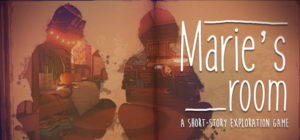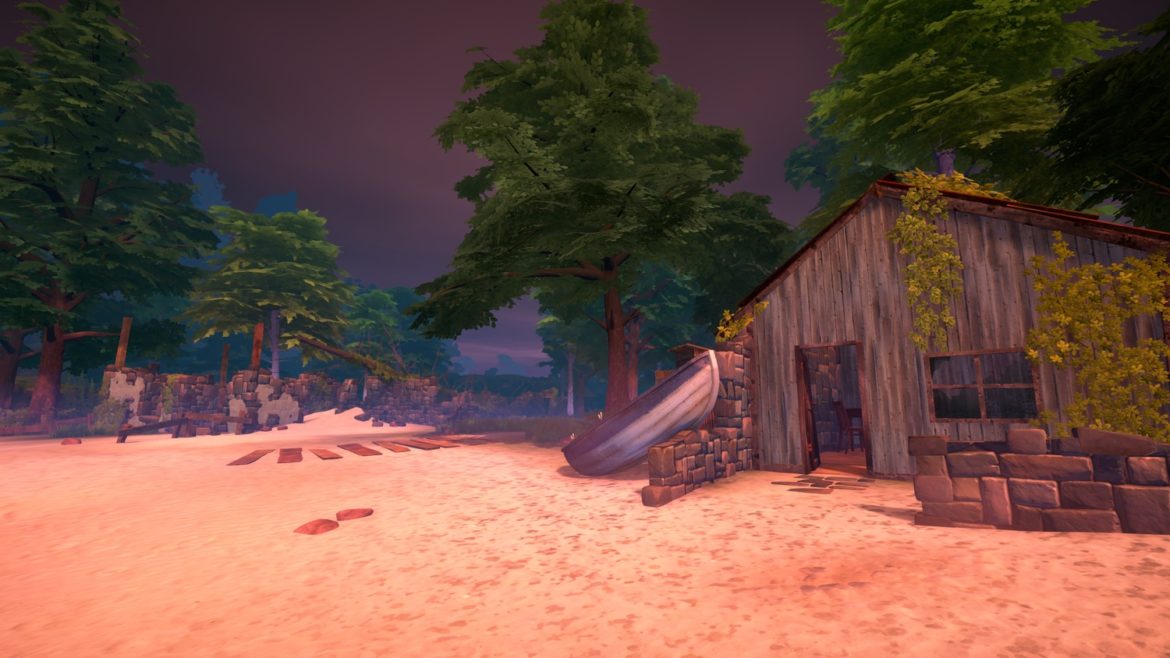Ghost on the Shore is a point and click, relationship exploration game about love and loss and the ties that bind us to those we care about beyond death. It’s being worked on by the team at Like Charlie and is planned for a release on Steam.
We recently spoke to the company’s Community Manager, Kristi Ramot and Like Charlie’s CEO (& GOTS narrative designer), Dagmar Blommaert about this upcoming title.
Here’s what they both had to say about the development and inspirations behind this most intriguing game.
Tell us about like Charlie and how the company came about. Also, where did the name, “like Charlie” come from?
Kristi: All great stories are about people, and this origin story is no different. 3D artist Kenny Guillaume and screenwriter Dagmar Blommaert met while working for a Belgian publisher Die Keure. They became great friends and began working on Kenny’s side project, a short story exploration game Marie’s Room.
18 months later Marie’s Room was released on Steam and was welcomed with overwhelming success by both players and critics. Dagmar and Kenny wanted to keep telling impactful stories and founded like Charlie in 2018. Several coworkers from Die Keure joined the team to work on the studio’s next project, Ghost on the Shore.
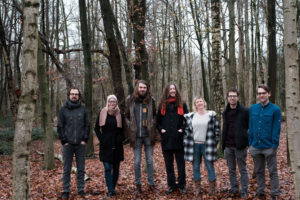
Dagmar: Working with Kenny we had almost no problems, but somehow finding the name for the studio was so hard. One day I was so frustrated and exclaimed: “it’s almost easier to name a child than a company!” I thought to myself that if I’d have another girl I’d name her Charlie, and that’s a cool name so I proposed that to Kenny.
He liked it because it reminded him of the movie Charlie and the Chocolate Factory. We were both new in the video game industry and it felt like this amazing wondrous place where great things are possible. We felt like Charlie stepping into the chocolate factory.
Tell us about your upcoming title, Ghost on the Shore.
Kristi: Ghost on the Shore is a story and relationship exploration game about ties that transcend even death. You play as Riley, a young woman who finds herself stranded on a desolate island with a headstrong ghost, dead for as long as he can remember.
As you explore the crumbling homes of the gone islanders and discover the remnants, you get to know the ghost Josh. Making irrevocable choices in dialogue you shape the bond with him, which ultimately influences the outcome of the game.
As Riley puts it all together, she comes to understand how an island’s history led to Josh’s death.
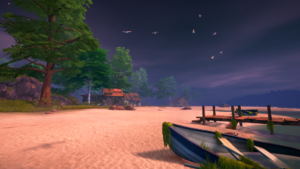
Dagmar: Ghost on the Shore’s idea came from a dream where I had died. My partner was struck with grief which I could feel and experience in great force. I wanted to help him but I couldn’t reach out. Eventually, I saw him deal with his pain and move on which pushed me further away. These mixed emotions kind of stayed with me after.
Then I saw a trailer to the movie Jamie Marks is Dead and the tagline says “How far would you go to be remembered?”. I found this such a strong idea and I wanted to do something with it, so I merged it with the dream. And it became a story about a love, the love dying and about holding on even after death.
GOTS takes place on a mysterious island. Was the island inspired by a real-life locale?
Dagmar: I got selected for a writing retreat on The Isle of Eigg in Scotland. I spent a week there writing throughout, creating the entire outline of the game’s story. I got a lot of inspiration from there while discovering the shores and talking to local people.


The cabin that I stayed in had a little library on people and folklore. I read all of those.
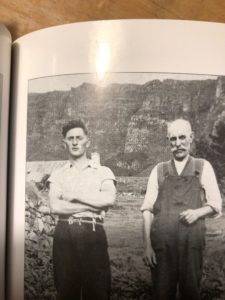
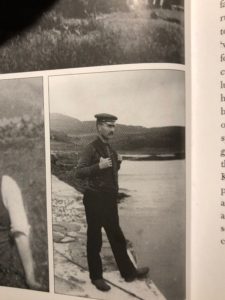
They too were an island that had been bought by a family to turn into a working force, like the Rogue Islands in Ghost on the Shore. There used to be a skipper named Scruff with a pet otter on Eigg. We named one of our characters after him.
One of the features of GOTS is relationship exploration. Can you describe this feature for us and give us a couple of examples of how this will work in the game?
Kristi: Relationship exploration is a unique feature that allows the player to make choices in a subtle, immersive way. Often games rely on what the character can choose to do. In Ghost on the Shore the narrative is driven by how the characters interact with each other.
For example, Josh likes to tease Riley and you might get irritated with these comments, so you choose to respond with something snarky. Depending on what kind of a relationship you have with him he can have several responses to this.
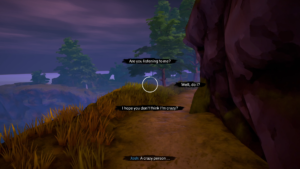
You might be laughed off or insulted in return. You might get passive-aggressive comments or an attempt to lighten the mood. The result of your choice isn´t always clearly presented, but depends more on the context and your prior actions.
We feel that’s very similar to how most arguments in real life happen and we want the interactions between characters to feel like a natural conversation.
Another feature is environmental storytelling. Can you explain this feature to us?
Kristi: The main storyline is centered around Riley meeting the ghost Josh and their journey across the Rogue Islands to uncover what happened to him. But these islands have many more stories about people who used to live there.
The lives of the dead were as vibrant and intricate as those who still live. We tell these stories through memories, trinkets left behind, run-down houses and the locations these people left their mark on.
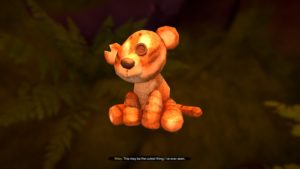
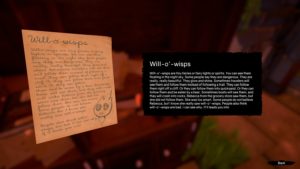
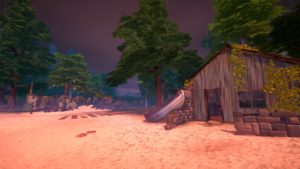
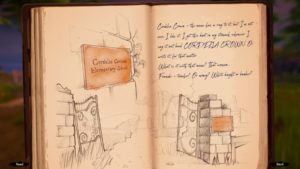
Imagine stepping into an old schoolhouse. You’d want to take a look around, scan the rubble, survey the papers on the shelves, investigate the teacher’s desk.
Why do we want to do that? It’s because we want to tell stories, especially to document the past. We want to be a witness to the people who came before.
How many possible endings will there be? Is the romance between Riley & her ghost a possibility?
Kristi: Without revealing the final number of endings, we promise at least a few.
The narrative branches are rooted in the relationship between Riley and Josh, which the player can affect through choices in the dialogue. Great news for the romantic at heart…yes, you can try to woo your ghost.
Your company is focused on creating narrative-driven games. Why is this your genre of choice? What do you love about this type of game?
Dagmar: To Kenny and me it’s a calling. We both love a good story and we love being able to tell a story. This works for us and feels completely natural. Adventure and exploration games are perfect for exploring how to tell an emotional story and also give the player freedom and agency.
I find that the constraints of an indie game also offers an interesting challenge.
Many games, such as Gone Home, Dear Esther, and others have proven that you don’t need a huge game world to offer an emotional experience.
In {our previously released title} Marie’s Room, we literally had a single in-game room to tell our story.
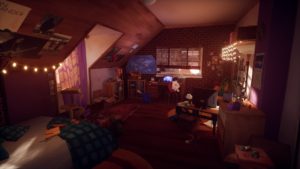
What are some of the challenges of creating a narrative-heavy game such as GOTS?
Dagmar: Design-wise the most challenging part is finding a good balance between giving the player agency and directing them through a set story.
We want the player to have agency, to have a choice, and {go at} their own pace, discovering the game world. At the same time, they are playing a set character and progressing down a narrative branch.
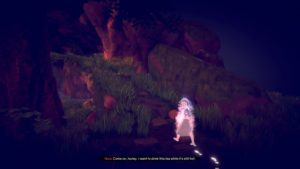
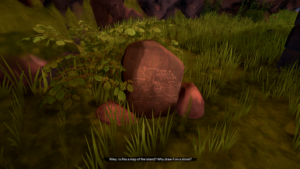
Kristi: Narrative heavy games also require a lot of playtesting, because people can interpret on-screen text in many ways.
Our voice actors are phenomenal and they do a great job portraying the personalities of the characters. This is especially important for dialogue, where the player needs to make a choice and the text on screen must fit their intent.
How/where do you find inspiration for your storylines?
Dagmar: We’re constantly doing a lot of research on various interesting locations and people. There’s a lot of historical events to draw from too.
In Ghost on the Shore we tell stories of islanders from the past 200 years. So there are many historical stories infused into it {such as} young men being drafted into wars, the hardship of living on the islands, how rich families bought small islands to make them work for profit, etc.
I also like to create characters inspired by real-life people.
For example, I found this photographer Margaret Fay Shaw, who took pictures of women on the harsh Scottish islands. I was fascinated by the stories of both the women and the photographer. She inspired one of the characters, a photographer, in the game.
A lot of the inspiration also comes from traveling, finding new locations, hearing local stories, then distilling the characters out of those.
Once you have the characters you get to tell a story through them.
Your date for GOTS on Steam is “coming soon.” Any idea yet on when the title might release?
Kristi: We’re being careful with specific promises at the moment because the global health crisis has left no one untouched. We are working hard on GOTS and everyone on the team is determined to finish it.
We hope the crisis gets resolved and we can share more information soon.
Any plans to bring GOTS to consoles?
Kristi: We’re releasing a PC version first. Ideally, we’d like to release for consoles later, but that depends on many factors, such as finding an experienced publisher who’d help with that.
Do you plan to release a demo prior to the game’s launch? Will the game be in Early Access on Steam?
Kristi: We will have a short demo available for a limited time before launch so that everyone can have a little taste.
Early Access wouldn’t work for Ghost on the Shore. Once you start playing, you want the full narrative experience. You need to be able to finish it.
What’s next for like Charlie?
Kristi: New ideas are constantly popping up. We archive them for safekeeping. But, it’s too early to talk about details of future projects.
Last question. What’s your best piece of advice to fellow indie developers who are trying to juggle their full-time jobs/responsibilities with creating a game on the side and maybe feeling a bit overwhelmed/discouraged?
Dagmar: If you’re working on your first game, I say just have fun with it.
Don’t set a fixed deadline, take your time and enjoy your work.
One of the best tricks for me is to schedule a time where I focus on the work that I enjoy the most. To me, it’s writing, so I need to do it in peace without all the worries of finances or marketing or whatever.
Getting to work on the thing you love will help to keep you motivated. Find a healthy balance between game dev and the rest of your life.
Surround yourself with peers or like-minded folk, in life or online, who you can show your stuff to, ask for advice and enjoy the journey together.
End Interview
Thanks so much to Dagmar & Kristi for answering our questions. We’ll look forward to playing Ghost on the Shore when it releases.
Ghost on the Shore can be wishlisted now on Steam.
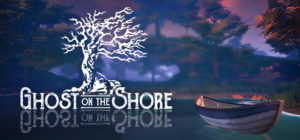
Watch a teaser trailer for the game on the Like Charlie YT channel.
Read more about GOTS on the developer’s website.
Keep up with the latest news via Twitter & Facebook.
Check out Like Charlie’s previous game, Marie’s Room, a free to play, short story, psychological mystery available now on Steam.
